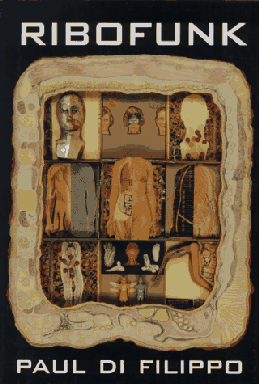From Wikipedia, the free encyclopedia
Biopunk (a portmanteau word combining "biotech" and "punk") is a term used to describe:
- A hobbyist who experiments with DNA and other aspects of genetics.[1][2]
- A techno-progressive movement advocating open access to genetic information.[3][4]
- A science fiction genre that focuses on biotechnology and subversives.[5]
[edit] Biohacker
Biopunk is a synonym for biohacker, a term used to describe a hobbyist who experiments with DNA and other aspects of genetics.[1][2] A biohacker is similar to a computer hacker who creates and modifies computer software or computer hardware as a hobby (i.e. "wetware hacker"), but should not be confused with a bioterrorist whose sole intent is the deliberate release of viruses, bacteria, or other germs used to cause illness or death in people, animals, or plants (in the same way a computer hacker should not be confused with the more popular use of the term, describing someone who spreads computer viruses or breaks into computers systems).[6] Using a laptop computer, published gene sequence information, and mail-order synthetic DNA, some promoters and critics of biohacking argue that just about anyone has the potential to construct genes or entire genomes from scratch, although this has never occurred.[7]
[edit] Movement
The biopunk movement is a small intellectual and cultural movement, which encompasses a growing number of scientists, artists and cultural critics who are organizing to create public awareness of how human genomic information, produced by bioinformatics, gets used and misused. On the basis of a presumed parallel between genetic and computational code, science journalist Annalee Newitz has called for open-sourcing of genomic databases.[3][4] Biological Innovation for Open Society is an example of an open-source initiative in biotechnology aiming to apply open license for biological innovation.[8]
Self-described "transgenic artist" Eduardo Kac uses biotechnology and genetics to create provocative works that concomitantly revel in scientific techniques and critique them. In what is probably his most famous work, Alba, Kac collaborated with a French laboratory to procure a green-fluorescent rabbit; a rabbit implanted with a green fluorescent protein gene from a type of jellyfish in order for the rabbit to fluoresce green under ultraviolet light.[3] The members of the Critical Art Ensemble have written books and staged multimedia performance interventions around this issue, including The Flesh Machine (focusing on in vitro fertilisation, surveillance of the body, and liberal eugenics) and Cult of the New Eve (analyzing the pseudoreligious discourse around new reproductive technologies).[9] Georgia Tech professor Eugene Thacker leads the Biotech Hobbyist collective, and has written extensively on the field.[10]
[edit] Science fiction genre
Biopunk science fiction is a sub-genre of cyberpunk fiction that portrays the underground side of the "biotech revolution" which, in the 1990s and 2000s, was expected to start having a profound impact on humanity in the first half of the 21st century. Biopunk stories explore the struggles of individuals or groups, often the product of human experimentation, against a backdrop of totalitarian governments or megacorporations which misuse biotechnologies as means of social control or profiteering. Unlike cyberpunk, it builds not on information technology but on synthetic biology. Like in postcyberpunk fiction, individuals are usually modified and enhanced not with cyberware, but by genetic manipulation.[5] A common feature of biopunk stories is the “black clinic”, which is a lab, clinic or hospital that performs illegal, unregulated or ethically-dubious biomod and gengineering procedures.[11]
One of the prominent writers in this field is Paul Di Filippo, though he called his collection of such stories ribofunk, with the first element being taken from the term ribosome.[12]
[edit] Film and television
|
[edit] Computer and video games
[edit] Comics and manga
|
- ^ a b Katz, J.S.: "Roses are Black, Violets are Green", New Scientist, 6 January, 1990
- ^ a b Katz, J.S.: "That which is not Forbidden is Mandatory", BioTech Educ, 4(1), 1990
- ^ a b c d Newitz, Annalee (2001). Biopunk. http://web.archive.org/web/20021220190353/http://www.sfbg.com/SFLife/tech/71.html. Retrieved on 2007-01-26.
- ^ a b Newitz, Annalee (2002). Genome Liberation. http://archive.salon.com/tech/feature/2002/02/26/biopunk/print.html. Retrieved on 2007-01-26.
- ^ a b c Quinion, Michael (1997). World Wide Words: Biopunk. http://www.worldwidewords.org/turnsofphrase/tp-bio3.htm. Retrieved on 2007-01-26.
- ^ Schrage, Michael (1988-01-31). "Playing God in Your Basement". Washington Post.
- ^ ETC Group (2007) (PDF). Extreme Genetic Engineering: An Introduction to Synthetic Biology. http://www.etcgroup.org/upload/publication/602/01/synbioreportweb.pdf. Retrieved on 2007-02-02.
- ^ "BiOS". http://www.bios.net/daisy/bios/home.html.
- ^ "Critical Art Ensemble". http://www.critical-art.net/.
- ^ "Biotech Hobbyist Magazine". http://xdesign.ucsd.edu/biotechhobbyist/index.html/.
- ^ Pulver, David L. (1998). GURPS Bio-Tech. Steve Jackson Games. ISBN 1556343361.
- ^ Fisher, Jeffrey (1996). Ribofunk. http://www.wired.com/wired/archive/4.11/ribopunk_pr.html. Retrieved on 2007-01-26.
- ^ "This Just In...News from The Agony Column". Trashotron.com. http://www.trashotron.com/agony/news/2005/04-11-05.htm. Retrieved on 2008-11-28.
- ^ a b c "Rhetoric Department". Rhetoric.berkeley.edu. http://rhetoric.berkeley.edu/undergraduate_courses.html. Retrieved on 2008-11-28.
- ^ "Locus Online: Review by Claude Lalumière". Locusmag.com. http://www.locusmag.com/2002/Reviews/Lalumiere05_WonderAnatomy.html. Retrieved on 2008-11-28.
- ^ "Science Fiction Book Reviews". Scifi.com. http://www.scifi.com/sfw/issue399/books.html. Retrieved on 2008-11-28.
- ^ Lalumiere BestOf2004.html
- ^ "White Devils by Paul McAuley - an infinity plus review". Infinityplus.co.uk. http://www.infinityplus.co.uk/fantasticfiction/whitedevils.htm. Retrieved on 2008-11-28.
- ^ "BioCentre". Bioethics.ac.uk. http://www.bioethics.ac.uk/index.php?do=topic&sid=6. Retrieved on 2008-11-28.
- ^ "NEUROETHICS | The Narrative Perspectives". Neuroethics.upenn.edu. http://www.neuroethics.upenn.edu/narrative_perspec.html. Retrieved on 2008-11-28.
- ^ "Illusion". Jrica.multiply.com. http://jrica.multiply.com/reviews?&page_start=40. Retrieved on 2008-11-28.
- ^ "Science Fiction News of the Week". Scifi.com. http://www.scifi.com/sfw/issue222/news.html. Retrieved on 2008-11-28.
- ^ "BioShock for Xbox 360 Reviews - Xbox 360 BioShock Reviews". 2K Games. August 21, 2007. http://www.gamespot.com/xbox360/action/bioshock/player_review.html?id=532056. Retrieved on 2008-11-28.
- ^ "Warren Ellis: Modify Your Body But Also Worry About the Planet". Io9.com. http://io9.com/341903/modify-your-body-but-also-worry-about-the-planet. Retrieved on 2008-11-28.
[edit] External links
- DIYbio.org, a community for DIY biological engineers
|
Cyberpunk and derivatives |
|
| Cyberpunk and derivatives |
|
|



